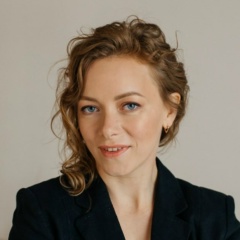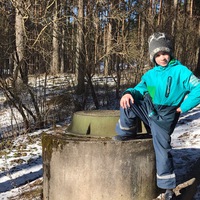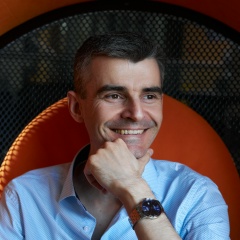В семейную психологию я попала благодаря двум людям.
Первая, это [id50352834|Катя Уголева], а на тот момент Екатерина Юрьевна, которую я увидела "в действии" в Иматоне на курсе у Палея. Она моделировала кейсы из нас, учащихся, и разбирала разные наши семейные хитросплетения. У меня на тот момент было очень много вопросов к себе и моим ближайшим родственникам, которые я никак не могла разрешить, и предложилась в качестве клиента. Мы провели консультацию в которой поучаствовали продставители Сережи, моих родиетей, родителей Сережи, Яшки, Антона и моих детей. Это было неожиданно и очень мощно. Я вдруг увидела своих близких значительно более трезво, это пугало и это вселяло надежду на то, что отношения могут измениться.
Где-то в то же время вторая ключевая фигура в этой истории, [id64757|Ленка Заитова], узнав, что я учусь у Кати, пригласила меня поконсультировать семьи. Вдвоем. Она на правах более опытной ведущей, я на правах стажера. Мы проработали в таком формате около года, и это был отличный опыт. Не знаю, насколько легко бы я вошла в работу с семьями, не чувствуя я тогда Ленкиной поддержки.
После этого год я работала одна, а потом началась наша с [id1220701|Юлей] "история любви", про которую я, кажется, все уши прожужжала :)
Работать с семьями одной трудно, и, если уж начистоту, страшно. На индивидуальной консультации сижу я, сидит человек, мы равны, даже, пожалуй, я чуточку равнее, поскольку кабинет мой, кресло мое, время мое, за помощью обратились ко мне. Даже если клиент непростой, все равно внутри есть смутное ощущение того, что, если что, хозяйкой положения остаюсь я.
Совсем другая история, если людей приходит больше одного. Муж с женой в ссоре, или мама/бабушка (или, о ужас, обе) приходят поговорить после консультации с подростком. Или, не дай Бог, пара с ребенком, потому что его оставить не с кем. Тревога подскакивает, земля из под ног уплывает. Сценарий происходящего, который я себе в голове нарисовала, стремительно обрастает непредвиденными деталями, как то "Мама, я хочу в туалет", хмурость и неразговорчивость одного из пары, или наоборот, поток слов и эмоций другого. Я теряюсь, я чуствую, что они сила, которая меня сейчас закрутит и швырнет об стену, или прокатится по мне, раздавив всмятку.
И стараешься устоять. Как получится. Тут поговорить с мамой, тут с папой, тут с бабушкой, тут с ребёнком позаниматься. По отдельности, так безопаснее. Каждый из разговоров, вроде ничего. Но при этом есть чувство, что сил потрачено вагон, а эффект мизерный. Ходят и ходят, шаг вперед два, шага назад.
Когда трудно, стараешься упростить задачу. Упростить, значит перейти в формат тет-а-тет. Заразиться видением каждого из участков. Запутаться, переключаясь между точками зрения. И, потеряв видение картинки в целом, потерять в качестве работы.
...
Тонкостей работы с семьями масса. Я описала только одну из них, с которой сталкивается либо начинающий семейный психолог, либо психолог, который, в основном, работает индивидуально, а с семьями время от времени, при случае. При этом семейная терапия - это необычайно мощный инструмент коррекции отношенческих сложностей. Чрезвычайно актуальный в наших, российских реалиях сложнопереплетенных семей.
Об это препятствие можно споткнуться и остановиться. Можно преодолеть.
Отсюда и родилась идея нашей с Юлей мастерской "СТАРТ для семейных психологов". Она подойдёт тем, у кого есть в голове куча теории и страх не суметь её применить. Она подойдёт тем, кто консультирует пары, но при этом хронически попадает в коалиции с одним из супругов. Она подойдёт детским и подростковым психологам, которые отлично работают с детьми, но испытывают сложности при установлении договоренностей с родителями.
Много практики, кейсы, супервизии случаев, отработка "объемного" системного мышление, научение узнавать паттерны и ловушки, которые нам подкидывают клиенты, построение системных гипотез об устройстве семьи, возможность попробовать поработать в паре с коллегой и, при необходимости, минимум теории, которая позволит нам говорить на одном языке.
Семейное консультирование - это то, что мы любим и умеем делать. Мы с радостью поделимся с вами нашим опытом.
Первая встреча мастерской через месяц, в среду 8-го ноября. Для участия напишите или позвоните нам с [id1220701|Юлей].
Подробно о расписании можно почитать в обсуждениях у нас в группе: https://vk.com/familypsyspb
И расскажите о нас тем, кто, вы думаете, может нуждаться в нашей поддержке.
Первая, это [id50352834|Катя Уголева], а на тот момент Екатерина Юрьевна, которую я увидела "в действии" в Иматоне на курсе у Палея. Она моделировала кейсы из нас, учащихся, и разбирала разные наши семейные хитросплетения. У меня на тот момент было очень много вопросов к себе и моим ближайшим родственникам, которые я никак не могла разрешить, и предложилась в качестве клиента. Мы провели консультацию в которой поучаствовали продставители Сережи, моих родиетей, родителей Сережи, Яшки, Антона и моих детей. Это было неожиданно и очень мощно. Я вдруг увидела своих близких значительно более трезво, это пугало и это вселяло надежду на то, что отношения могут измениться.
Где-то в то же время вторая ключевая фигура в этой истории, [id64757|Ленка Заитова], узнав, что я учусь у Кати, пригласила меня поконсультировать семьи. Вдвоем. Она на правах более опытной ведущей, я на правах стажера. Мы проработали в таком формате около года, и это был отличный опыт. Не знаю, насколько легко бы я вошла в работу с семьями, не чувствуя я тогда Ленкиной поддержки.
После этого год я работала одна, а потом началась наша с [id1220701|Юлей] "история любви", про которую я, кажется, все уши прожужжала :)
Работать с семьями одной трудно, и, если уж начистоту, страшно. На индивидуальной консультации сижу я, сидит человек, мы равны, даже, пожалуй, я чуточку равнее, поскольку кабинет мой, кресло мое, время мое, за помощью обратились ко мне. Даже если клиент непростой, все равно внутри есть смутное ощущение того, что, если что, хозяйкой положения остаюсь я.
Совсем другая история, если людей приходит больше одного. Муж с женой в ссоре, или мама/бабушка (или, о ужас, обе) приходят поговорить после консультации с подростком. Или, не дай Бог, пара с ребенком, потому что его оставить не с кем. Тревога подскакивает, земля из под ног уплывает. Сценарий происходящего, который я себе в голове нарисовала, стремительно обрастает непредвиденными деталями, как то "Мама, я хочу в туалет", хмурость и неразговорчивость одного из пары, или наоборот, поток слов и эмоций другого. Я теряюсь, я чуствую, что они сила, которая меня сейчас закрутит и швырнет об стену, или прокатится по мне, раздавив всмятку.
И стараешься устоять. Как получится. Тут поговорить с мамой, тут с папой, тут с бабушкой, тут с ребёнком позаниматься. По отдельности, так безопаснее. Каждый из разговоров, вроде ничего. Но при этом есть чувство, что сил потрачено вагон, а эффект мизерный. Ходят и ходят, шаг вперед два, шага назад.
Когда трудно, стараешься упростить задачу. Упростить, значит перейти в формат тет-а-тет. Заразиться видением каждого из участков. Запутаться, переключаясь между точками зрения. И, потеряв видение картинки в целом, потерять в качестве работы.
...
Тонкостей работы с семьями масса. Я описала только одну из них, с которой сталкивается либо начинающий семейный психолог, либо психолог, который, в основном, работает индивидуально, а с семьями время от времени, при случае. При этом семейная терапия - это необычайно мощный инструмент коррекции отношенческих сложностей. Чрезвычайно актуальный в наших, российских реалиях сложнопереплетенных семей.
Об это препятствие можно споткнуться и остановиться. Можно преодолеть.
Отсюда и родилась идея нашей с Юлей мастерской "СТАРТ для семейных психологов". Она подойдёт тем, у кого есть в голове куча теории и страх не суметь её применить. Она подойдёт тем, кто консультирует пары, но при этом хронически попадает в коалиции с одним из супругов. Она подойдёт детским и подростковым психологам, которые отлично работают с детьми, но испытывают сложности при установлении договоренностей с родителями.
Много практики, кейсы, супервизии случаев, отработка "объемного" системного мышление, научение узнавать паттерны и ловушки, которые нам подкидывают клиенты, построение системных гипотез об устройстве семьи, возможность попробовать поработать в паре с коллегой и, при необходимости, минимум теории, которая позволит нам говорить на одном языке.
Семейное консультирование - это то, что мы любим и умеем делать. Мы с радостью поделимся с вами нашим опытом.
Первая встреча мастерской через месяц, в среду 8-го ноября. Для участия напишите или позвоните нам с [id1220701|Юлей].
Подробно о расписании можно почитать в обсуждениях у нас в группе: https://vk.com/familypsyspb
И расскажите о нас тем, кто, вы думаете, может нуждаться в нашей поддержке.
I got into family psychology thanks to two people.
The first is [id50352834 | Katya Ugoleva], and at that time Ekaterina Yurevna, whom I saw "in action" in Imaton, on a course at Paley. She modeled cases of us students, and sorted out our various family intricacies. At that time I had a lot of questions for myself and my closest relatives, which I could not resolve in any way, and was offered as a client. We had a consultation in which the representatives of Seryozha, my parents, the parents of Seryozha, Yashka, Anton and my children participated. It was unexpected and very powerful. I suddenly saw my loved ones much more soberly, it scared and it inspired hope that the relationship could change.
Somewhere at the same time, the second key figure in this story, [id64757 | Lenka Zaitova], learning that I was studying with Katya, invited me to advise families. Together. She is a more experienced presenter, I am an intern. We worked in this format for about a year, and it was a great experience. I don’t know how easy it would be for me to go into work with families without Lenkina’s support.
After that, I worked alone for a year, and then our “love story” began with [id1220701 | Yulia], about which I seem to have buzzed all my ears :)
Working with families alone is difficult, and, frankly, scary. I sit at an individual consultation, a man sits, we are equal, even, perhaps, I’m a little more equal, because my office, my chair, my time, turned to me for help. Even if the client is not easy, there is still a vague feeling inside that, if anything, I remain the mistress of the situation.
A completely different story, if more than one person comes. A husband and wife are in a quarrel, or mom / grandmother (or, horror, both) come to talk after consulting with a teenager. Or, God forbid, a couple with a child, because there is no one to leave him with. Anxiety jumps, the earth floats from under the feet. The scenario of what is happening, which I have drawn in my head, is rapidly overgrown with unforeseen details, such as “Mom, I want to go to the toilet”, the frowning and taciturnity of one of the couple, or vice versa, the flow of words and emotions of the other. I’m lost, I feel that they are the force that will spin me now and throw me against the wall, or it will roll over me, crushing soft-boiled.
And you try to resist. We'll see how it goes. Then talk with mom, here with dad, here with grandma, here with the child to work out. Separately, it’s safer. Each of the conversations seems to be nothing. But at the same time, there is a feeling that the wagon spent energy, and the effect is scanty. Walk and walk, two steps forward, two steps back.
When it’s difficult, you try to simplify the task. To simplify, then go to the tete-a-tete format. Get infected with the vision of each of the sites. Confused by switching between points of view. And, having lost the vision of the picture as a whole, lose in quality of work.
...
The intricacies of working with families are many. I described only one of them, which is faced either by a novice family psychologist or a psychologist who mainly works individually, and with families from time to time, on occasion. At the same time, family therapy is an unusually powerful tool for correcting relational difficulties. Extremely relevant in our Russian realities of complexly intertwined families.
You can stumble and stop about this obstacle. Can be overcome.
From here the idea of our workshop “START for family psychologists” was born with Yulia. It is suitable for those who have a bunch of theory in their heads and fear of not being able to apply it. It is suitable for those who advise couples, but at the same time chronically falls into a coalition with one of the spouses. It is suitable for child and adolescent psychologists who work well with children, but have difficulty establishing agreements with their parents.
A lot of practice, cases, case supervision, working out “volumetric” systemic thinking, learning to recognize patterns and traps that customers give us, building system hypotheses about family structure, the opportunity to try to work together with a colleague and, if necessary, a minimum of theory that will allow we speak the same language.
Family counseling is what we love and know how to do. We will be happy to share our experience with you.
The first meeting of the workshop a month later, on Wednesday, November 8th. To participate, write or call us with [id1220701 | Julia].
Details about the schedule can be found in the discussions in our group: https://vk.com/familypsyspb
And tell us about us to those who, you think, may need our support.
The first is [id50352834 | Katya Ugoleva], and at that time Ekaterina Yurevna, whom I saw "in action" in Imaton, on a course at Paley. She modeled cases of us students, and sorted out our various family intricacies. At that time I had a lot of questions for myself and my closest relatives, which I could not resolve in any way, and was offered as a client. We had a consultation in which the representatives of Seryozha, my parents, the parents of Seryozha, Yashka, Anton and my children participated. It was unexpected and very powerful. I suddenly saw my loved ones much more soberly, it scared and it inspired hope that the relationship could change.
Somewhere at the same time, the second key figure in this story, [id64757 | Lenka Zaitova], learning that I was studying with Katya, invited me to advise families. Together. She is a more experienced presenter, I am an intern. We worked in this format for about a year, and it was a great experience. I don’t know how easy it would be for me to go into work with families without Lenkina’s support.
After that, I worked alone for a year, and then our “love story” began with [id1220701 | Yulia], about which I seem to have buzzed all my ears :)
Working with families alone is difficult, and, frankly, scary. I sit at an individual consultation, a man sits, we are equal, even, perhaps, I’m a little more equal, because my office, my chair, my time, turned to me for help. Even if the client is not easy, there is still a vague feeling inside that, if anything, I remain the mistress of the situation.
A completely different story, if more than one person comes. A husband and wife are in a quarrel, or mom / grandmother (or, horror, both) come to talk after consulting with a teenager. Or, God forbid, a couple with a child, because there is no one to leave him with. Anxiety jumps, the earth floats from under the feet. The scenario of what is happening, which I have drawn in my head, is rapidly overgrown with unforeseen details, such as “Mom, I want to go to the toilet”, the frowning and taciturnity of one of the couple, or vice versa, the flow of words and emotions of the other. I’m lost, I feel that they are the force that will spin me now and throw me against the wall, or it will roll over me, crushing soft-boiled.
And you try to resist. We'll see how it goes. Then talk with mom, here with dad, here with grandma, here with the child to work out. Separately, it’s safer. Each of the conversations seems to be nothing. But at the same time, there is a feeling that the wagon spent energy, and the effect is scanty. Walk and walk, two steps forward, two steps back.
When it’s difficult, you try to simplify the task. To simplify, then go to the tete-a-tete format. Get infected with the vision of each of the sites. Confused by switching between points of view. And, having lost the vision of the picture as a whole, lose in quality of work.
...
The intricacies of working with families are many. I described only one of them, which is faced either by a novice family psychologist or a psychologist who mainly works individually, and with families from time to time, on occasion. At the same time, family therapy is an unusually powerful tool for correcting relational difficulties. Extremely relevant in our Russian realities of complexly intertwined families.
You can stumble and stop about this obstacle. Can be overcome.
From here the idea of our workshop “START for family psychologists” was born with Yulia. It is suitable for those who have a bunch of theory in their heads and fear of not being able to apply it. It is suitable for those who advise couples, but at the same time chronically falls into a coalition with one of the spouses. It is suitable for child and adolescent psychologists who work well with children, but have difficulty establishing agreements with their parents.
A lot of practice, cases, case supervision, working out “volumetric” systemic thinking, learning to recognize patterns and traps that customers give us, building system hypotheses about family structure, the opportunity to try to work together with a colleague and, if necessary, a minimum of theory that will allow we speak the same language.
Family counseling is what we love and know how to do. We will be happy to share our experience with you.
The first meeting of the workshop a month later, on Wednesday, November 8th. To participate, write or call us with [id1220701 | Julia].
Details about the schedule can be found in the discussions in our group: https://vk.com/familypsyspb
And tell us about us to those who, you think, may need our support.

У записи 14 лайков,
2 репостов,
544 просмотров.
2 репостов,
544 просмотров.
Эту запись оставил(а) на своей стене Инга Кузнецова



































